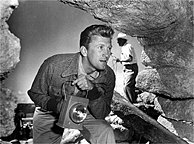Rethinking Jimmy Carter
Much of the commentary upon the passing of President Gerald Ford debates his decision to pardon President Nixon for his Watergate break-in cover-up: whether it healed to move forward, or whether it missed an opportunity to make more explicit the rule of law for his successors. There’s another pardon that isn’t discussed, which may have had more lasting effects: the Ford and President Carter approaches to amnesty and pardon for Vietnam war draft dodgers and deserters.
President Carter’s abdication of the even minimal responsibility for one’s actions demanded by both President Ford and the public has had more lasting deleterious effects for America than the pardon of an already punished Nixon.
The consensus reflection upon the life of President Gerald Ford is that he led by an exceedingly decent, honorable and honest life, and that at a most trying and divisive time in our history he calmed tensions for the nation to go forward. I couldn’t agree more. The Moderate Voice offers a broad sampling of the reflections. One, by “Captain” Ed Morrissey of CaptainsQuarters blog, is referred to as a “must read,” and as usual for the “Captain” it is.
Regarding the pardon of President Nixon, most see the need for this healing, with Nixon having paid the price of loss of office being seen as adequate punishment. Some on the Left see a lost opportunity to further damn the electorate that overwhelmingly elected him. These critics revile Nixon, and Ford, for seeking a “peace with honor” finale to the U.S. involvement in Vietnam. They ignore the consequences of their post-Watergate abandonment of U.S. pledges of aid to South Vietnam, including the death and concentration camps suffered by millions, and the encouragement to adversaries elsewhere against a weak-willed America that continues to this day.
To get a better appreciation of the arguments, one might consider the Ford and Carter approaches to amnesty and pardon for Vietnam era draft dodgers and deserters. Ford offered a healing plan that was consistent with America’s post-war treatment of draft evaders and deserters, conditioned by pledge of allegiance to America and two-year’s service. The Left held out for an unconditional pardon, which they largely got from Carter.
I was part of this debate at the time. In the March 3, 1972 The Daily Pennsylvanian, I wrote an op-ed in the University of Pennsylvania newspaper (where I was a post-Vietnam service grad student) opposed to unconditional amnesty. It caught the eye of Freedom House, where an expanded version was published in the March-April 1973 Freedom at Issue magazine. This caught the attention of the Los Angeles Times, who reprinted it in their Sunday, March 25, 1973 opinion section. (My piece was given twice the space as the opposing view by Jean-Paul Satre!)
I noted that a Gallup poll in 1972 found only 7% in favor of unconditional amnesty. I showed that most of the unconditional amnesty supporters came from a “premise of intolerance. Not only are the evaders and deserters to be welcomed back, but they are to be welcomed as heroic resisters of a nefarious policy of purposeful genocide.”
As late as February 23, 2001, James Webb (before his devil’s deal with the Kos’ian descendants of the decision by Carter to pardon Vietnam era evaders and deserters) wrote in the Wall Street Journal:
Mr. Carter's first official act as president was to pardon, en masse, all those who had been or could be charged with draft evasion during the Vietnam era. Motivated by the ever-present desire of American politicians to "heal the wounds" of the Vietnam War, and beyond doubt manipulated by the army of antiwar McGovernites who had seized control of the Democratic Party, Mr. Carter's gesture had the symbolic effect of elevating everyone who had opposed the Vietnam War to the level of moral purist, and by implication insulting those who often had struggled just as deeply with the moral dimensions of the war and had decided, often at great sacrifice, to honor the laws of their country and serve….Nor did President Carter's abuse of power end with the pardoning of draft evaders. Some had criticized this blanket amnesty as having made class distinctions between college boys who were "enlightened" enough to oppose the draft and blue-collar boys who had gone into the military and then either seen the light regarding the war or suffered the supposed abuses of the military system. Liberal groups and antiwar politicians assailed the "inequities" of military justice and the "randomness" of its characterization of service when one left the military, despite the fact that 97% of those who served during Vietnam had been discharged under honorable circumstances. Within weeks of pardoning all the draft evaders, Mr. Carter invoked his powers as commander in chief and ordered that the "bad paper" military discharges of hundreds of thousands of deserters, malcontents and nonperformers be mandatorily upgraded, so long as they met one of six easily attained criteria.
Again President Carter had upset a delicately balanced apple cart among the Vietnam generation. By wiping the slate clean for those who had dodged the draft or created problems while in the military, he signaled to those who had served honorably during a horribly emotional period that their self-discipline, loyalty, wounds and even deaths did not matter….
These acts resonate when one evaluates Bill Clinton's incessantly arrogant presidency, from the endless string of conscious and serious abuses of power to the "conversion" of White House furniture and china on his way out the door. For what we are seeing are the echoes of a pervasive elitism, from people who were taught when young that the laws that applied to their countrymen did not necessarily apply to them.


<< Home